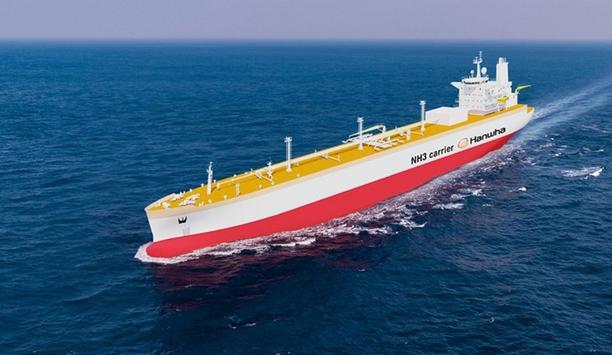Hanwha Ocean - Experts & Thought Leaders
Latest Hanwha Ocean news & announcements
Wärtsilä Gas Solutions, part of technology group Wärtsilä, will supply the cargo handling systems for two very large Ammonia Carrier (VLAC) vessels being built at the Hanwha Ocean shipyard in Korea. The 88,000 m3 capacity vessels have been ordered by a Japanese ship owner. This latest order, which was booked by Wärtsilä in Q2 2025, further strengthens the company’s established position as a supplier of cargo handling systems. “We have good experience with Wärtsilä’s cargo handling systems. Their support and quick reaction to our needs have always been much appreciated, and their systems are perfectly designed for these two VLACs,” says Mr. Lee, Leader of Basic Design Team, Hanwha Ocean Co. Continuous successful strategy implementation VLACs are essentially Very Large Gas Carriers but are designed to carry full cargoes of ammonia. Since ammonia has a high specific gravity, VLAC cargo tanks and hulls need to be reinforced, and the vessels will have a deeper draught when fully loaded. "Enabling decarbonised shipping operations is at the core of our strategy. This contract is an additional proof point for continuous successful strategy implementation, while reinforcing our strong partnership with Hanwha," comments Patrick Ha, Sales Manager, Wärtsilä Gas Solutions. The Wärtsilä equipment is scheduled for delivery to the yard commencing in Q4 2025.
Hanwha Ocean has received the ABS SMART (SHM) Tier 3 approval in principle (AIP) for its advanced hull monitoring system. The system from Hanwha Ocean is designed to estimate structural damage to ships and offshore assets during operation, which can support decision-making for the optimal maintenance timing to maintain safety. ABS SMART(SHM) Tier 3 ABS SMART(SHM) Tier 3 recognises systems that employ hull sensors combined with additional algorithms to generate structural health insights at critical locations, even at locations where no sensors are present. The AIP is one of the first fruits of the Offshore Technology Collaboration Agreement signed by ABS and Hanwha Ocean in 2024. The agreement promotes technology development in three areas: digitalisation and artificial intelligence, cybersecurity operations, and sustainability. Adoption of smart technologies in the maritime sectors AIP is one of the first fruits of the Offshore Technology Collaboration Agreement signed by ABS in 2024 Patrick Ryan, ABS Senior Vice President and Chief Technology Officer, said, "ABS celebrates this achievement with Hanwha Ocean, a milestone in our collective pursuit of safety at sea." He adds, "As a pioneer in supporting the adoption of smart technologies in the maritime and offshore sectors, ABS recognises the transformative capabilities of these systems – advancing health and condition awareness, operational optimisation and, eventually, classification supported by condition-based programs." Hull monitoring system from Hanwha Ocean "Recently, shipowners have been including digital technologies as part of their contractual requirements, and classification societies are also in the process of refining regulations related to digitalisation. Based on this approval, we will proactively respond to the growing demand for smart and digital technologies in the shipping industry," said Young Chang Shon, Chief Technology Officer of Hanwha Ocean. The hull monitoring system from Hanwha Ocean is being developed in accordance with the ABS Guide for Smart Functions for Marine Vessels and Offshore Units.
ABS has awarded Hanwha Ocean Approval in Principle (AIP) for its Pre-FEED Standard FPSO Design intended to create an asset optimised for deployment in the deep waters of West Africa. The FPSO design is 340 m long and capable of storing approximately 2.38 million barrels of crude oil, with a daily crude oil production capacity of 190,000 barrels. Developed to accommodate topsides for crude oil and or gas production facilities, the hull is designed to operate for up to 20 years without the need for dry docking. Advanced digital solutions All kit has been electrified to reduce operational costs throughout unit’s lifecycle To address the recent tightening of environmental regulations, the FPSO is set to incorporate technologies such as zero-flaring, GHG monitoring, and an energy management system. All equipment has been electrified to reduce operational costs throughout the unit’s lifecycle. Additionally, advanced digital solutions, including cybersecurity, digital twin, and predictive maintenance, have been integrated. Technological innovation and product development “ABS is a world pioneer in FPSO classification and we are proud to be able to use this experience to support Hanwha Ocean with their innovative, flexible approach,” said Matt Tremblay, ABS Vice President, Global Offshore. Hanwha Ocean Engineering Manager of Standard FPSO Project and Company officials of Hanwha Ocean Co., Ltd said: “We anticipate continued growth in demand for offshore plants, particularly in West Africa and South America. We will continue to strengthen our global competitiveness through continuous technological innovation and product development.”










